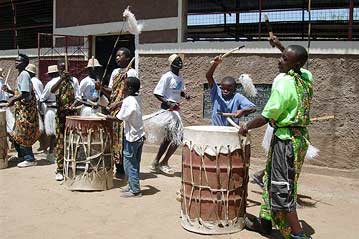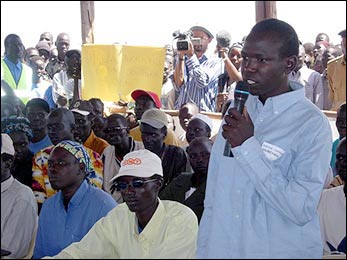First willing refugees could return to South Sudan after rainy season, says UNHCR

KAKUMA REFUGEE CAMP, Kenya.
Aug 30, 2005 (UNITED NATIONS) — UN High Commissioner for Refugees António Guterres promised Tuesday that the first refugees will go home to South Sudan in October, and he urged them to work with the new South Sudanese authorities to consolidate peace in their homeland.
“You have the same rights as I do,” Guterres told representatives of the 89,000 refugees in Kakuma camp in north-western Kenya, “the right to a home in your homeland.”
Pledging that the UN refugee agency would help some of Kakuma’s 66,000 South Sudanese refugees go home as soon as the rainy season ends, the High Commissioner said: “I am going to be very clear. There will not be any kind of forced return. Return will only be voluntary. Nobody will be forced to go back. This is the first guarantee.”
On the second last day of a 10-day mission that has already taken him to Khartoum, Darfur, Chad and South Sudan, Guterres met representatives of Kakuma’s refugees in a gathering that opened with a minute’s silence for Dr. John Garang, leader of the Sudanese People’s Liberation Movement who died in a helicopter crash on July 30, just three weeks after being sworn in as Sudan’s vice-president.
Guterres praised Garang for not only fighting for the rights of his people, but for also negotiating an end to 21 years of civil war between Sudan’s north and south.
“The men and women who are able to fight for their rights but who also are able to reconcile, forgive and make peace are the wisest,” he said.
He also asked South Sudanese to help Garang’s successor, Salva Kiir, to keep the peace deal on track. The international community can help to do this and to rebuild South Sudan – but the peace process “must be owned by the Sudanese people,” Guterres said. “It will not be the foreigners who will solve the problems.”
Guterres met some of the 5,000 South Sudanese who have arrived in Kakuma since the peace deal was signed in January this year. One of them told him there is still inter-communal fighting and militia attacks in parts of the south, and that “peace was signed, but peace was not implemented in our hearts.”
Some 100 West Sudanese refugees also arrived in Kakuma a month ago after having walked a full nine months from their homes in Darfur, where fighting is still going on. They said Janjaweed militias had prevented them from crossing into Chad where UNHCR is running 12 camps housing more than 200,000 Darfur refugees.
“This is our plea. Let us put our hands together with the international community to bring peace to Darfur,” a refugee told Guterres, referring to a war that broke out in February 2003 and that has displaced nearly two million people.
South Sudanese women told Guterres they were “very worried” about losing the rights they have enjoyed in Kakuma once they go back to South Sudan. They said they fear being subjected to harmful cultural practices such as female genital mutilation, forced marriage and wife inheritance.
To drive the point home, a group of teenage girls recited a poem for the High Commissioner called “Who Cares?” The words ran:
To my mother, I am a beast of burden
To my father, a source of income
To my brothers and cousins, a servant
To a sugar daddy, a fruit
Who Cares?
But as they also told Guterres in a song: “We are so happy. We know everything is going to be done” because of his visit, which ends Wednesday with talks with Kenyan government officials.
By Kitty McKinsey
In Kakuma and Nairobi

